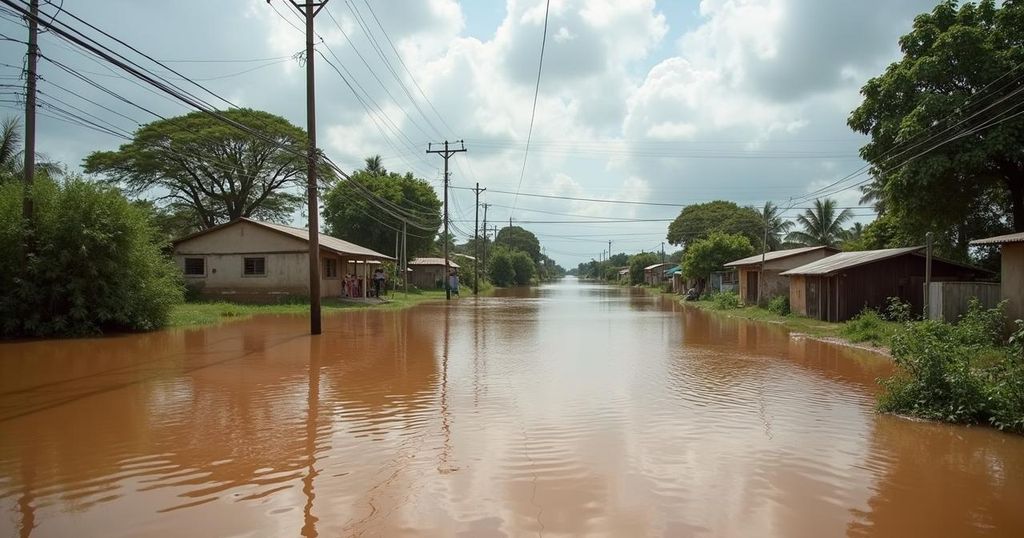Severe Flooding in South Sudan Displaces Over 241,000 as Humanitarian Crisis Deepens

The UN reports that flooding in South Sudan has affected 893,000 individuals, displacing over 241,000. The country is experiencing one of its worst flood crises in decades, severely impacting access to aid and exacerbating existing humanitarian issues characterized by food insecurity and economic decline. Political instability continues to hinder recovery efforts, as delays in elections and governance reforms frustrate the populace.
In a recent report, the United Nations Office for the Coordination of Humanitarian Affairs (OCHA) disclosed that approximately 893,000 individuals have been impacted by severe flooding in South Sudan, with over 241,000 individuals displaced from their homes. This alarming situation marks one of the most significant flooding events the nation has experienced in decades, exacerbated by the country’s considerable vulnerability to climate change. \n\nThe humanitarian crisis has rendered key supply routes impractical due to heavy rains and rising water levels, severely limiting access for aid efforts. The OCHA report indicates that the floods have affected 42 of the 78 counties in South Sudan and have particularly devastated the Unity and Warrap states, which account for more than 40% of those affected. \n\nDisplaced individuals are reportedly seeking refuge on higher ground across 16 counties and the Abyei area, an area disputed by both South Sudan and Sudan. \n\nSince its independence in 2011, South Sudan has struggled with long-standing instability, conflict, economic decline, and natural disasters, such as droughts and floods. The World Bank has highlighted the effect of these floods on an already dire humanitarian situation, characterized by acute food insecurity, ongoing conflict, disease outbreaks, and the broader implications of the Sudan conflict spilling into South Sudan. The Bank anticipates that around nine million people, including refugees, will face critical humanitarian needs in 2024. \n\nFurthermore, the conflict in Sudan has resulted in a substantial influx of refugees into South Sudan, with reports indicating that over 797,000 refugees have crossed the border as of September, predominantly comprising South Sudanese returnees. \n\nPolitical instability continues to hinder progress in South Sudan, particularly following the recent announcement to extend the transitional period, initially established under a 2018 peace agreement, thereby postponing elections set for December by an additional two years. Key elements of this agreement, including the establishment of a new constitution and the integration of opposing military factions led by President Salva Kiir and opposition leader Riek Machar, remain unfulfilled. The ongoing delays have bred frustration among the South Sudanese populace and the international community. UN mission chief Nicholas Haysom expressed that there exists a profound sense of disappointment and fatigue among the citizens, emphasizing a subsequent requirement for demonstrable commitment from the country’s leaders toward a democratic governance future.\n\nDespite its rich oil resources, South Sudan’s economy has faced further challenges following the damage inflicted on an essential export pipeline in Sudan earlier this year.
South Sudan, the world’s youngest nation, gained independence from Sudan in 2011. Since then, it has been plagued by enduring instability, frequent conflicts, economic hardships, and various natural disasters, including severe droughts and floods. The country is particularly susceptible to the effects of climate change, making such disasters devastating. The ongoing humanitarian crisis is compounded by political issues and civil unrest, leading to critical shortages of food and other essential services. The World Bank has characterized the nation’s humanitarian situation as grave, with predictions of increasing needs in the coming year. Moreover, the political landscape remains tumultuous, exacerbating public frustrations and hampering potential progress towards stability.
The flooding crisis in South Sudan has brought to light the profound humanitarian challenges faced by the nation, severely impacting a significant portion of its population and complicating an already delicate situation characterized by instability and economic decline. The UN and other aid organizations are calling for urgent efforts to provide necessary support, even as political uncertainties linger. Stakeholders have expressed a pressing need for clear commitments from South Sudan’s leadership to initiate democratic transformations and engage in restorative measures that will address both humanitarian and governance issues.
Original Source: www.barrons.com








